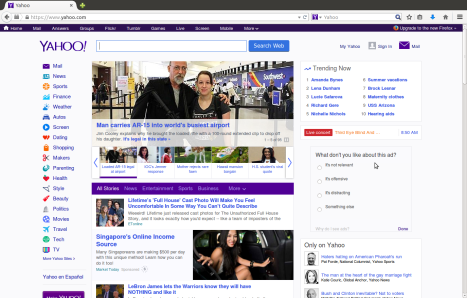Though Yahoo lists open redirect vulnerability on its bug bounty program. However, it seems Yahoo do not take this vulnerability seriously at all.
Multiple Open Redirect vulnerabilities were reported Yahoo. All Yahoo’s responses were “It is working as designed". However, these vulnerabilities were patched later.
Several other security researcher complained about getting similar treatment, too.
http://seclists.org/fulldisclosure/2014/Jan/51
http://seclists.org/fulldisclosure/2014/Feb/119
From report of CNET, Yahoo’s users were attacked by redirection vulnerabilities. “Yahoo.com visitors over the last few days may have been served with malware via the Yahoo ad network, according to Fox IT, a security firm in the Netherlands. Users visiting pages with the malicious ads were redirected to sites armed with code that exploits vulnerabilities in Java and installs a variety of different malware. "
http://www.cnet.com/news/yahoo-users-exposed-to-malware-attack/
Moreover, since Yahoo is well-known worldwide. these vulnerabilities can be used to attack other companies such as Google, eBay, The New York Times, Amazon, Godaddy, Alibaba, Netease, e.g. by bypassing their Open Redirect filters (Covert Redirect). These cyber security bug problems have not been patched. Other similar web and computer flaws will be published in the near future.
The vulnerabilities can be attacked without user login. Tests were performed on Microsoft IE (10.0.9200.16750) of Windows 8, Mozilla Firefox (34.0) & Google Chromium 39.0.2171.65-0 ubuntu0.14.04.1.1064 (64-bit) of Ubuntu (14.04),Apple Safari 6.1.6 of Mac OS X Lion 10.7.
Disclosed by:
Jing Wang, Division of Mathematical Sciences (MAS), School of Physical and Mathematical Sciences (SPMS), Nanyang Technological University (NTU), Singapore. (@justqdjing)
http://www.tetraph.com/wangjing
Both Yahoo and Yahoo Japan online web application has a computer cyber security bug problem. It can be exploited by Unvalidated Redirects and Forwards (URL Redirection) attacks. This could allow a user to create a specially crafted URL, that if clicked, would redirect a victim from the intended legitimate web site to an arbitrary web site of the attacker’s choosing. Such attacks are useful as the crafted URL initially appear to be a web page of a trusted site. This could be leveraged to direct an unsuspecting user to a web page containing attacks that target client side software such as a web browser or document rendering programs.
BugTraq is a full disclosure moderated mailing list for the *detailed* discussion and announcement of computer security vulnerabilities: what they are, how to exploit them, and how to fix them. The below things be posted to the Bugtraq list: (a) Information on computer or network related security vulnerabilities (UNIX, Windows NT, or any other). (b) Exploit programs, scripts or detailed processes about the above. (c) Patches, workarounds, fixes. (d) Announcements, advisories or warnings. (e) Ideas, future plans or current works dealing with computer/network security. (f) Information material regarding vendor contacts and procedures. (g) Individual experiences in dealing with above vendors or security organizations. (h) Incident advisories or informational reporting. (i) New or updated security tools. A large number of the fllowing web securities have been published here, Injection, Broken Authentication and Session Management, Cross-Site Scripting (XSS), Insecure Direct Object References, Security Misconfiguration, Sensitive Data Exposure, Missing Function Level Access Control, Cross-Site Request Forgery (CSRF), Using Components with Known Vulnerabilities, Unvalidated Redirects and Forwards. It also publishes suggestions, advisories, solutions details related to Open Redirect vulnerabilities and cyber intelligence recommendations.
(1) Yahoo.com Open Redirect
Domain:
yahoo.com
“Yahoo Inc. (styled as Yahoo!) is an American multinational technology company headquartered in Sunnyvale, California. It is globally known for its Web portal, search engine Yahoo Search, and related services, including Yahoo Directory, Yahoo Mail, Yahoo News, Yahoo Finance, Yahoo Groups, Yahoo Answers, advertising, online mapping, video sharing, fantasy sports and its social media website. It is one of the most popular sites in the United States. According to news sources, roughly 700 million people visit Yahoo websites every month. Yahoo itself claims it attracts more than half a billion consumers every month in more than 30 languages. Yahoo was founded by Jerry Yang and David Filo in January 1994 and was incorporated on March 1, 1995. Marissa Mayer, a former Google executive, serves as CEO and President of the company." (Wikipedia)
Vulnerable URLs:
Another Yahoo Open Rediect Vulnerability Video Published Before:
https://www.youtube.com/watch?v=GTd1Gkj6OUY
Blog:
http://securityrelated.blogspot.com/2014/12/yahoo-yahoocom-open-redirect-security.html
http://securityrelated.blogspot.com/2014/10/yahoo-open-redirect-vulnerability.html
Domain:
yahoo.co.jp
“Yahoo! JAPAN Corporation (ヤフージャパン株式会社 Yafū Japan Kabushiki-gaisha?) is a Japanese internet company formed as a joint venture between the American internet company Yahoo! and the Japanese internet company SoftBank. It is headquartered at Midtown Tower in the Tokyo Midtown complex in Akasaka, Minato, Tokyo. Yahoo! Japan was listed on JASDAQ in November 1997. In January 2000, it became the first stock in Japanese history to trade for more than ¥100 million per share. The company was listed on the Tokyo Stock Exchange in October 2003 and became part of the Nikkei 225 stock market index in 2005. Yahoo! Japan acquired the naming rights for the Fukuoka Dome in 2005, renaming the dome as the “Fukuoka Yahoo! Japan Dome". The “Yahoo Dome" is the home field for the Fukuoka SoftBank Hawks, a professional baseball team majority owned by SoftBank." (Wikipedia)
Use one of webpages for the following tests. The webpage address is “http://itinfotech.tumblr.com/“. Suppose that this webpage is malicious.
Vulnerable URL:
POC:
http://order.store.yahoo.co.jp/cgi-bin/yj-affiliate-entry?ITRACK_INFO=087836355102152107140219030330&COOKIE_PATH=/&COOKIE_DOMAIN=.yahoo.co.jp&VIEW_URL=http://itinfotech.tumblr.com/
More Articles:
http://seclists.org/fulldisclosure/2014/Dec/88
http://marc.info/?l=full-disclosure&m=141897158416178&w=4
https://www.mail-archive.com/fulldisclosure%40seclists.org/msg01467.html
http://securityrelated.blogspot.com/2014/12/yahoo-yahoocom-yahoocojp-open-redirect.html
https://hackertopic.wordpress.com/2015/01/15/yahoo-yahoo-japan-vulnerable-to-spams/
https://plus.google.com/110001022997295385049/posts/4GTENtJY9XE
https://twitter.com/justqdjing/status/546910373169741825
https://www.facebook.com/pcwebsecurities/posts/701648936647693
http://homehut.lofter.com/post/1d226c81_6e6884f
https://tetraph.wordpress.com/2014/12/28/yahoo-open-redirect/
http://itinfotech.tumblr.com/post/118511508076/securitypost-yahooyahoo-japan-may-be
https://computerpitch.wordpress.com/2015/01/27/yahoo-vulnerable-to-spams/
http://testingcode.lofter.com/post/1cd26eb9_73096b9
http://lifegrey.tumblr.com/post/120767572004/yahoo-url-redirection-bug
http://blog.163.com/greensun_2006/blog/static/1112211220155565419870/
http://aibiyi.blogspot.com/2015/06/yahoo-open-redirect.html
https://www.facebook.com/tetraph/posts/1659455054274454
http://www.inzeed.com/kaleidoscope/computer-web-security/yahoo-to-spams/
http://www.tetraph.com/blog/spamming/yahoo-url-redirection/


